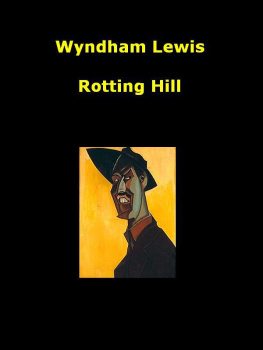Wyndham Lewis
Rotting Hill
Wyndham Lewis
(18821957)
Rotting Hill
(1951)
Table of Contents
Foreword
If I write about a hill that is rotting, it is because I deplore rot. For the decay of which I write is not romantic decay. But specific persons or Parties are in no way accountable for the rot. It is either the fault of everybody or of nobody. If we exist, shabby, ill-fed, loaded with debt (taxed more than any men at any time have ever been), let us recognize that the sole explanation of this is our collective stupidity. If it soothes us to pin the blame upon our masters, past or present, by all means let us do so. The fact remains that this is only a subjective judgement. But who is responsible for ten years of war in a generation? All human groups, whether French, German, Italian, Polish, Korean, Japanese, Chinese, Czecho-Slovak, or any other are like our own a raw material, and are not responsible for the shape they take. I should add that our ostensible masters are raw material too. War is what is immediately responsible for the chaos which afflicts us at the present time. No cause can be assigned for these fearfully destructive disturbances (though of course we account for them in this or that conventional way, in our history books and in our conversation). The most recent wars have entirely altered our lives, that is all we can say.
In 1945 we ended a second, a six-year spell of war. We came out of this a ruined society, our economy destroyed, our riches vanished, our empire reduced to a shadow of itself, but our island-population (optimistically built-up to the absurd total of fifty millions) undiminished and requiring just as much food as when we had the money to pay for it. Naturally everybody was dazed. But into this situation burst a handful of jubilant socialists, voted into power, with an overwhelming majority, on the Labour ticket. They were in no way dismayed by the national situation; they proceeded to extract by huge taxation, direct and indirect, the colossal capital needed to stage a honeymoon for the liberated manual-working mass. This of course gave no one any time to despair at the disappearance of national prosperity. The majority of the nation was highly stimulated: and if the landed society was taxed out of existence, the middle class in rapid dissolution, on the whole England became a brighter rather than a darker place. To symbolize this extraordinary paradox the capital city burst into festivities all along the south bank of the Thames; there was whoopee at Battersea, there was the thunder of orchestras in a new national concert-hall, a thousand peep-shows, culminating in a Dome of Discovery lower down the river. This was staged in the ward sanctified by Shakespeare. In the Parliament the lamb lay down with the lion; the Tory bleated softly and snoozed beside the rampant socialist lion: all England seemed to have decided to forget that it had lost everything, and to live philosophically from day to day upon the Dole provided by the United States.
Such is the situation at the moment of writing. In spite of this extremely brilliant, if exceedingly artificial situation, nevertheless decay is everywhere, as might be expected. If an aristocratic society suddenly drops to pieces, after many centuries, and if a mercantile class of enormous power and wealth drops to pieces at the same time, there is inevitably a scene of universal wreckage and decay, as when demolition work is in progress. In a great city like London large areas, until ten years ago expensive and select, become shabby or even slummish overnight; the food and other shortages make an end of good restaurants, the shortage of power dims the streets, the high cost of everything turns a well-heeled citizenry into a shoddy, shabby herd, which shuffles round the shops from morning till night in a dense tide.
For the seamy side of socialist splendour the socialists are blamed. Mr. Patricks, the socialist shopman whose toy-shop you are invited to visit in the ensuing pages, says that his customers even blame the heat and the cold, the rain and the snow and the sleet on the Government. And then, of course, the very bounty of the socialists, their lavish honeymoon spending, militated against the austerity of life and dedication to work which was required to build the New Jerusalem. Decades of ca canny and the ingrained habit of go-slow, producing a population of the laziest workmen in Europe, has proved the arch-enemy of socialism. So there is a big cancer, a deep rot in the heart of the industry now controlled by the new masters, which it may require a very harsh dictator to eradicate.
I have now supplied you with the credentials of the Rot which is the subject matter of this book of stories. Among the persons gathered between the covers of Rotting Hill those who are more or less adult talk a good deal about the situation created by the rapid conversion of England into a Welfare State; the toiling majority naturally do not discuss Welfare States, merely respond vocally to the pleasant or unpleasant stimuli for which the high-ups of whatever political philosophy are responsible. But most of my personnel belong to the disintegrating middle-class, and they naturally discuss the Welfare State since it has a good deal of bearing upon their destinies.
At this point I should perhaps meet the question, to be anticipated after the above delivery of the credentials of the Rot, Is this a political book? Not more, it can truthfully be answered than some of Charles Dickens books, and all by Mr. Shaw, to go no further afield. If my characters are obsessed by politics, it is because today our lives are saturated with them. It is impossible for a work of narrative fiction worth reading to contain less politics than Rotting Hill. And those who would contradict me and assert that contemporary fiction can be otherwise than steeped in politics are those who would prefer that you would not have anything to do with books that cause you to use your rational faculty. Best to confine your reading to Detective Stories and to Western Yarns! Nay why read at all, they would argue? Why not save paper so that the Government may have more for its multifarious bureaucratic activitiesmore than it already takes? Just turn on Dick Barton, then take the dog for a nice long tree-crawl and go to bed and dream of next summers Butlin Camp holiday!
Socialism is a word to which we need not pay very much attention. Socialism is merely the name of something which is happening to us, something which could not otherwise than happen, in view of all historical factors present, above all the proliferation of mechanical techniques. If we refrain from looking upon it as a purely political phenomenon we shall understand it better. In the present work there is, however, one factor which is especially stressed; namely, socialism seen as a final product of bible-religion.
Conscience is at the root of the principle of Social Justicewithout it what would be there? That ethical impulse is of a potency to which no law of nature could attain. It is all that remains of Protestant Christianity excepting Christmas Carols, the sacraments of baptism and of marriage, especially in villages where the church is the only public building: and except for burial, of course, since there is nowhere you can dispose of a corpse except the churchyard. But the conscience is almost entire still with some people, though they regard God as quite as Victorian a phenomenon as The Lady of the Lamp and would couple the Bible with Euclid as part of the quaint furniture of childhood.
They would be very surprised indeed to hear they had a conscience. Let me try and show in a few words, how absolutely impossible socialism would have been without the Christian religion. Mr. Attlee and Sir Stafford Cripps as much as Mr. Gladstone are good church-going Christians: and their socialism is Mr. Gladstones liberalism taken to its ultimate conclusion. In other words, liberalism was an early stage of socialism. And the nineteenth century of liberalism was demonstrably a product of Christianity: it was at long last the Christian seriously trying to put the New Testament into practice. The culmination of this movement, still using the word liberal to describe itself, was Lloyd Georges National Insurance Act. That was a most revolutionary measure, far more advanced than any adopted in any other country at that time. Finally, the logical conclusion of Gladstone and Morley, and Lloyd George and all their fellow preachers of social fair play, of social justice, was for the classes possessed of money and power to surrender them, and, of course, for England itself as a nation owning a quarter of the globe to surrender everythingas has recently been done in the case of Englands greatest possession, Indiaexcept this island; and even that must in the end not be looked upon with too possessive an eye.






